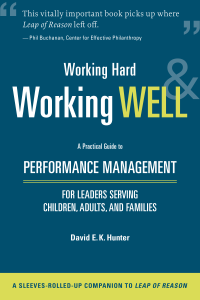 The following post is an excerpt from David Hunter’s excellent book Working Hard–and Working Well, a “roll–up–your–sleeves” companion to Leap of Reason by Mario Morino. We have consistently found we can build more effective Salesforce systems for organizations that have a clear vision for the outcomes they want to achieve. This excerpt includes important tactics to employ when driving user adoption of performance management systems. You can download the entire book in three electronic formats and sign up for the Leap Update, a monthly email that shares interesting resources about the importance of a high performance culture, courageous leadership, innovation, and merit-based funding. Our thanks to David for allowing us to publish this excerpt.
The following post is an excerpt from David Hunter’s excellent book Working Hard–and Working Well, a “roll–up–your–sleeves” companion to Leap of Reason by Mario Morino. We have consistently found we can build more effective Salesforce systems for organizations that have a clear vision for the outcomes they want to achieve. This excerpt includes important tactics to employ when driving user adoption of performance management systems. You can download the entire book in three electronic formats and sign up for the Leap Update, a monthly email that shares interesting resources about the importance of a high performance culture, courageous leadership, innovation, and merit-based funding. Our thanks to David for allowing us to publish this excerpt.
Organizations that are serious about implementing performance management must adopt a new motto: “If it’s not in our data system, it didn’t happen.” Staff members and managers should not expect to be credited for undocumented activities, and the quality and quantity of their work should be assessed against clear performance standards using operational data. Here are some basic points:
1. It is essential to review each manager’s and staff person’s data entry weekly, at least in the first two to three months, until everyone enters data regularly without prodding. Once that point is reached, leaders and managers should continue reviewing data entry on a regular basis (although the frequency might be reduced) as part of supervision and program management. After another three months, all managers and staff should be held accountable for the quality and completeness of their data.
2. Key data sets, such as client demographics, staff activities, program participation, and client outcome information, must be reviewed for missing information or inaccurate entries. Initially, staff who have not entered their data should be reminded to do so and shown how to correct mistakes. Leaders and managers should not make the corrections themselves, unless they plan to continue doing so forever. [Note: exception reports are an effective way to identify missing or inaccurate information.]
3. Performance-management data systems must be useful to all staff—especially front-line workers. The most compelling reason to implement a performance-management system is to improve the quality of work, effectiveness, and efficiency of the front-line staff—because this is the pathway to better results for clients. The process of ensuring staff buy- in to the system is never completed—and is critical. If the staff find that the software is useful in organizing, tracking, and improving the results of their daily work, they are more likely to use it enthusiastically and well. This means designing easy ways for them to do data entry and retrieve key information, with “point of service” screens that help them monitor what they are doing with each client and see how well each client is responding, as well as to develop “to-do” lists and manage their work accordingly. Over time, frontline staff—and also supervisors and managers—will become sophisticated end users of the system and request additional functions to help them even more. Such requests should be given high priority!
4. Continue training staff after “going live.” Nobody retains everything they learned during initial training on a new data system, so refresher courses based on feedback and what the data reveal about training needs will be useful. Training is also an opportunity to build momentum and inspire the staff by showcasing not only positive client results but also staff members whose work is improving measurably.
5. Tie the staff’s use of the performance-management data system to job descriptions and performance reviews. While many staff members find that such systems offer great support in their work, others may need a little push. In the end, use of the data system by staff and managers at all levels of the organization must become nonnegotiable, and how well they do so should be assessed as part of annual performance reviews.
– David Hunter, Working Hard–and Working Well